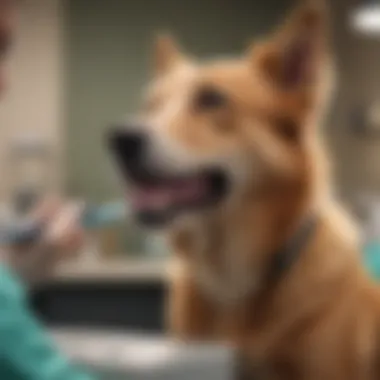Understanding the Cost of Dogs' Dental Cleaning Services


Intro
Dental health is often an overlooked aspect of pet care. Just like humans, dogs need professional teeth cleaning to maintain their overall health. This article aims to shed light on the costs associated with getting dogs' teeth cleaned. Knowing these factors can help pet owners prepare financially and understand the importance of regular dental care.
Pet Care and Grooming
Importance of Regular Care
Regular dental care is vital for a dog's well-being. It prevents various health issues such as gum disease, tooth decay, and bad breath. Even more critically, poor oral health can lead to more serious conditions, affecting organs like the heart and kidneys.
A preventive approach can save pet owners money in the long run. Not addressing dental issues can lead to costly treatments later on. Thus, the initial cost of regular cleanings may seem high but is valuable when considering potential future expenses.
Grooming Techniques by Pet Type
Different breeds have varying grooming needs. Small dogs may require more frequent cleanings due to their predisposition for dental issues. Larger breeds may need less frequent, yet thorough, care. Understanding the specific needs of your dog’s breed can guide your grooming schedule and choices.
Tools and Products Recommendations
Investing in quality dental tools can enhance at-home care. Some essential items include:
- Dog toothbrush: A soft-bristled brush designed for pets.
- Dog toothpaste: Formulated specifically for canine use.
- Dental chews: Helps reduce plaque during play.
- Mouthwash: Provides additional protection against bacteria.
Using these tools regularly helps maintain dental hygiene between professional cleanings.
Seasonal Care Tips
Seasonal changes may impact your pet's dental health. During certain times of the year, dogs may have dietary shifts that require closer attention to their teeth. For instance, holidays may introduce new treats that are not ideal for dental health. Stay mindful of your dog’s intake and schedule cleanings accordingly.
Health and Nutrition
Understanding Pet Nutrition
Proper nutrition plays a crucial role in maintaining good oral health. Feeding your dog high-quality kibble can support dental care by naturally cleaning teeth during chewing. Avoiding overly sticky or sugary foods is also important to prevent plaque accumulation.
Common Health Issues by Species
Different dog breeds have unique predispositions to dental problems. For example, brachycephalic breeds such as Bulldogs often face dental overcrowding. Understanding these issues can prepare owners for specific dental needs.
Preventive Care and Regular Check-Ups
Annual veterinary visits are recommended to monitor dental health. These visits may include professional cleanings, which contribute to better oral hygiene. Early detection can prevent more significant issues, resulting in better health and potentially lower costs.
Food and Dietary Advice
Consulting with a veterinarian can help choose the right diet for your dog. Some brands are specifically formulated to promote oral health. Look for options that include:
- Dental formulations
- Tartar control
- Natural ingredients
Maintaining a proper diet combined with regular dental care curtails the risk of severe health issues.
Engaging Activities and Enrichment
Fun Games to Play with Your Pet
Actively engaging your dog can enhance their physical well-being and reduce stress. Games such as fetch or tug-of-war help keep them mentally stimulated and physically fit, reducing the need for excessive dental treats.
DIY Toys and Activities
Creating your own dog toys can be a fun, cost-effective way to keep your pet entertained. Ensuring that these toys are safe and non-toxic is crucial. There are many tutorials online for simple yet effective DIY projects tailored for dogs.
Importance of Mental Stimulation
Staying mentally engaged is just as important as physical exercise. Activities such as puzzle toys or hide-and-seek can promote mental health, reducing stress-related dental issues caused by anxiety.
Outdoor Adventures and Exploration
Taking your dog on outdoor adventures provides both exercise and a chance to explore new environments. Exposure to different surfaces and terrains can naturally clean their teeth, supporting overall dental health.
Resources and Community Engagement
Recommended Books and Websites
For further reading on canine dental health, consider resources like American Kennel Club (akc.org) and The Association of American Veterinary Medical Colleges (aavmc.org). These websites offer invaluable insights about pet care and healthy practices.
Forums and Groups for Pet Owners
Participating in online forums can help pet owners share insights and tips. Platforms such as Reddit can provide a space for discussion and shared experiences with canine dental care. Engaging with a community fosters better informed decisions for your dog's health.
Finding Local Services and Classes


Identifying local veterinary services that specialize in dental care is beneficial. Many pet stores also offer classes about maintaining pet health, which might include grooming and dental care.
Encouraging Community Sharing and Contributions
Encouraging pet owners to share their experiences can build a wealth of knowledge. Sharing anecdotal evidence about successful dental care can guide others in their pet care journey.
Regular dental cleanings can save you money in future vet bills by preventing serious health issues.
Prelude to Canine Dental Health
Dental health in canine companions is often neglected, yet it serves as a cornerstone for their overall well-being. Understanding this topic lays the groundwork for recognizing the complex relationship between oral hygiene and long-term health outcomes. Depending on their breed, age, and living conditions, dogs face varied dental challenges. Thus, a comprehensive approach to canine dental health can significantly improve not just the quality of life but also extend their lifespan.
Importance of Dental Hygiene
Proper dental hygiene is crucial for dogs, as it prevents common health issues that arise from neglect. Plaque and tartar buildup can lead to periodontal disease, affecting the gums and eventually seeping into vital organs. In more severe cases, animals can suffer from heart, liver, or kidney problems due to bacteria from the mouth entering the bloodstream. An effective dental hygiene routine typically involves regular professional cleanings, at-home brushing, and the use of dental treats.
To emphasize the importance of this care:
- Regular cleanings can help prevent diseases,
- Reduces bad breath,
- Promotes a healthier and more active pet.
A regular and structured dental care program can save pet owners from expensive treatments and emotional distress when health issues arise.
Common Dental Issues in Dogs
Dogs, like humans, can experience a variety of dental problems. Recognizing these can facilitate timely intervention and treatment. Some of the common dental issues include:
- Plaque and Tartar Buildup: This is the initial stage that can lead to gum diseases.
- Gum Disease: This condition can be quite painful and may lead to tooth loss.
- Broken or Chipped Teeth: These injuries can occur during play or chewing.
- Oral Tumors: While less common, these can be serious and need immediate veterinary attention.
These issues can be both painful and detrimental to a dog’s health, so pet owners should remain vigilant and consult a veterinarian at the first signs of oral discomfort.
Cost Breakdown of Dog Teeth Cleaning
Understanding the cost components of dog teeth cleaning is vital for pet owners. Not only does this knowledge enable informed financial planning, but it also emphasizes the significance of maintaining dental health in dogs. Poor dental hygiene can lead to severe health issues, including heart disease and infections. By breaking down the costs, pet owners can grasp the financial commitment required but also consider the long-term benefits associated with good dental care.
Average Prices for Professional Cleaning
Professional cleaning prices for dog teeth can generally range from $200 to $800. Factors included in this range are the age and health of the dog, the size and breed, and the specific veterinary clinic's pricing structure. Larger dogs often incur higher costs due to the complexity of the procedure. Additionally, clinics that offer advanced technology and specialized services may charge more. It’s also important to consider annual check-ups usually recommended for monitoring dental health.
Variations by Location
The geographical area significantly impacts the pricing of dog teeth cleaning. In urban areas, the cost is often higher compared to rural communities. Veterinarians in cities may have greater overhead costs due to rent and salaries, which they pass on to customers. Moreover, specific regions may have a higher population of pet owners, leading to competitive pricing. Pet owners should research and compare prices across local veterinarians to find the best deal, while also considering the quality of service.
Factors Influencing Cost
Several elements can influence the cost of dog teeth cleaning:
- Type of Facility: Veterinary clinics may charge differently compared to dog spas or grooming salons.
- Additional Procedures: If the vet finds dental issues during the cleaning, extra procedures like tooth extractions can lead to additional charges.
- Anesthesia: Most professional cleanings require anesthesia, adding another layer to the overall cost. For example, the anesthesia cost can range from $50 to $200.
- Pre-Existing Health Issues: Dogs with health problems may require special attention or medications, impacting service price.
Regular dental cleaning is not just an expense; it is an investment in the dog's long-term health.
Understanding these contributing factors can help pet owners make better choices about their pets' dental care and budget accordingly.
In-House vs.
Veterinary Services
The choice between in-house cleaning and veterinary dental services can significantly impact the cost and quality of care for your dog's dental health. Each option offers distinct advantages and disadvantages that pet owners should carefully consider. Understanding these factors is crucial for making informed decisions about dental care.
Pros and Cons of In-House Cleaning
In-house cleaning often provides a more accessible and convenient option for some pet owners, particularly those who seek a simpler solution. Here are the key pros and cons:
Pros:
- Cost-Effective: In-house cleaning services typically cost less than veterinary dental care. This savings can be significant for pet owners with budget constraints.
- Convenience: Since in-house cleaners can often come to your home or may operate locally, the time and travel effort are minimized for pet owners.
- Comfortable Environment: Some dogs may feel less anxious in a familiar setting, which can contribute to a smoother cleaning experience.
Cons:
- Limited Expertise: In-house cleaning personnel may not have the same level of training or experience as veterinarians or veterinary technicians. This difference can lead to potential oversight of serious dental issues.
- Lack of Anesthesia: Many in-house services do not use anesthesia, which may restrict the cleaning process and prevent certain areas from being properly addressed.
- Diagnostic Limitations: Without the capability to perform X-rays or other diagnostics, in-house services might miss underlying dental problems that require immediate attention.
Benefits of Veterinary Dental Care
Veterinary dental care provides a comprehensive approach to maintaining a dog's oral health. Understanding the benefits helps pet owners appreciate why investing in this service may be necessary, despite the higher costs.
Key Benefits:
- Expertise and Training: Veterinarians and their teams have specialized training in animal healthcare. They can identify and treat a variety of dental issues that in-house services may overlook.
- Comprehensive Procedures: Veterinary practices generally utilize anesthesia, allowing for thorough cleaning and intervention. This means deeper cleaning and the ability to perform necessary extractions or treatments without causing stress to the dog.
- Diagnostic Tools: Access to advanced diagnostic equipment such as X-rays helps vets identify underlying dental issues that may not be visible during a routine cleaning.
- Post-Operative Care: After dental procedures, veterinary clinics provide essential follow-up care and guidance, ensuring that any complications are managed promptly.
“Investing in professional dental care is not just about maintaining a clean mouth; it's about ensuring your dog's overall health and well-being.”


Preliminary Costs to Consider
Before engaging in professional dental cleaning for your dog, it is essential to understand the preliminary costs that you may encounter. These costs lay the foundation for making informed decisions about your pet's dental care. Knowing what to expect prevents unpleasant surprises and helps in budgeting effectively.
One key consideration is the initial veterinary consultation. During this visit, the veterinarian assesses your dog's overall health and dental condition. This step is vital because it ensures that your dog is fit for the dental procedures. The veterinarian may identify any underlying health issues that could complicate dental care.
Another significant cost involves diagnostic testing. These tests may include dental x-rays or blood work to provide a complete picture of your dog's dental health and general well-being. Understanding these preliminary costs allows you to prepare financially. It also helps to set realistic expectations regarding the total expenditure for your dog's dental care.
In essence, addressing these initial expenses ensures that you are fully aware of the financial requirements before diving into more extensive treatments. This foresight allows for effective budgeting and planning, which benefits both you and your pet in the long run.
"Investing in initial assessments can save you more in the future."
Careful consideration of these preliminary steps provides a clearer view of your dog's dental needs and aids in evaluating the importance of ongoing oral health care.
Aftercare and Follow-Up Costs
After dental cleaning, dogs require proper aftercare and follow-up to ensure their recovery and maintain oral health. Understanding aftercare and follow-up costs is vital for pet owners who want to avoid unexpected expenses. This section provides insights into essential aspects, promoting awareness and preparedness regarding aftercare.
Medications and Recovery Supplies
Post-cleaning, dogs might need medications to manage pain or prevent infections. Commonly prescribed medications may include pain relievers and antibiotics. Pain management is crucial; it ensures your pet remains comfortable during recovery.
When vetting choices for medications, consider if your veterinary service provides these items or if you need to obtain them at a local pharmacy. The costs of common medications can vary significantly. Prescription pain relievers can run anywhere from $15 to $60 for a course. Antibiotics could cost $20 to $50.
Also, you might need to purchase recovery supplies such as:
- Soft food: A change in diet may be recommended. Soft food can help reduce discomfort while eating.
- Dental wipes or rinses: To help maintain oral hygiene post-cleaning, specific products can be beneficial.
- E-collars: A cone may be necessary to prevent your dog from irritating their mouth after cleaning.
The total cost for these items ranges between $30 and $150, depending on what is required.
Follow-Up Appointments
Follow-up appointments are crucial in monitoring your dog's recovery after dental cleaning. These visits allow the veterinarian to check for potential complications or ensure that the initial cleaning was effective. Regular follow-ups can detect issues early in their development.
For many pet owners, the prospect of incurring additional vet fees can be daunting. Follow-up visits typically cost between $50 and $100, depending on the vet’s location and practice. During these appointments, the vet can:
- Check for signs of infection or discomfort.
- Discuss ongoing dental hygiene practices.
- Schedule future cleanings if necessary.
Healthier teeth and gums lead to overall better health. Regular follow-up can also contribute to longer intervals between professional cleanings, creating potential savings over time.
In summary, the aftercare phase is integral to your pet's dental health. It involves careful consideration of the medications and supplies needed for recovery, as well as the necessity of follow-up appointments to monitor your dog’s progress. By planning for these costs, you can help ensure your furry friend remains healthy and happy.
Preventative Care to Reduce Costs
Preventative care is a crucial aspect of maintaining your dog's dental health. Taking proactive measures can significantly reduce the likelihood of needing costly treatments down the line. By investing in daily dental practices and regular professional cleanings, dog owners can avoid serious health issues that arise from poor oral hygiene.
Daily Dental Hygiene Practices
Establishing a routine for daily dental hygiene can be quite simple yet effective. Here are some key practices to consider:
- Brushing: Regular tooth brushing is the best way to prevent plaque buildup. Use toothpaste formulated for dogs since human toothpaste can be harmful.
- Dental Chews: Incorporating dental chews into your dog's diet can help reduce plaque and tartar. Look for chews that have the Veterinary Oral Health Council (VOHC) seal of approval.
- Water Additives: Some water additives are designed to promote oral health. These additives can help reduce harmful bacteria in your dog's mouth.
- Regular Inspection: Check your dog's teeth and gums frequently. Look for signs like redness or swelling which may indicate problems that need attention.
By practicing these habits daily, you can help maintain your dog's dental hygiene and minimize the need for expensive interventions.
Professional Cleanings: Frequency and Necessity
While at-home care is critical, professional cleanings should not be overlooked. It is generally recommended that dogs receive dental cleanings from a veterinarian at least once a year. However, the specific frequency may depend on several factors, including:
- Breed: Certain breeds are more prone to dental issues. For instance, smaller breeds may require more frequent cleanings.
- Age: Older dogs might develop dental problems more easily, increasing the need for regular professional care.
- Existing Conditions: If a dog already has dental disease, more frequent cleanings may be essential to manage the situation effectively.
Owning a pet carries financial responsibilities, but utilizing preventative care can save money in the long run. Regular professional cleanings can help catch problems before they worsen, reducing the potential for emergency treatments and costly procedures.
“An ounce of prevention is worth a pound of cure.” Understanding the importance of preventative care in your dog’s dental hygiene can lead to healthier teeth and gums, resulting in less strain on your finances.
Comparing Dog Dental Products
Comparing dog dental products is a crucial aspect of maintaining your pet’s oral hygiene. The right products can significantly improve your dog’s dental health while also minimizing long-term veterinary costs. By understanding the various options on the market, pet owners can select products that best meet their needs. The key elements to consider include the efficacy of the products, ease of use, and the pet's acceptance of them.
Toothpaste and Brushes
When it comes to dog dental care, choosing the correct toothpaste and brushes is fundamental. Not all human toothpastes are safe for dogs; many contain xylitol, which is toxic to them. Therefore, it is essential to use toothpaste specifically made for dogs. These products typically come in flavors that appeal to pets, making brushing a more pleasant experience.
A good quality dog toothbrush often has a soft-bristled head designed to suit their mouth size. Some options even feature dual-ended designs, allowing you to clean effectively in hard-to-reach areas. Regular brushing, ideally at least two to three times a week, can help prevent plaque build-up and gum disease. You can even use finger brushes as a beginner option, which might be more comfortable for both you and your dog.
Key points to remember:
- Use dog-specific toothpaste.
- Choose soft-bristled brushes for comfort.
- Establish a brushing routine for maximum effectiveness.
Dental Chews and Treats


Dental chews and treats also play an essential role in your dog's oral health. Selecting high-quality dental chews can help to reduce tartar and plaque as your dog chews. Products such as Greenies and Whimzees are designed not only to taste good but also to promote better dental hygiene. Many dog owners find these chews convenient, as they require no brushing and can serve as enjoyable rewards.
When comparing dental treats, it is important to consider the ingredients. Look for chews made from natural components without unhealthy additives. Additionally, some products bear the Veterinary Oral Health Council (VOHC) seal, indicating they have met specific standards for plaque and tartar control. Incorporating these treats into your dog’s diet can complement regular brushing and lead to better results.
Important considerations:
- Opt for high-quality treats.
- Check for VOHC approval for efficacy.
- Balance dental chews with other dental care practices for optimal results.
Maintaining your dog's dental health through proper products not only extends their life but also enhances their quality of life. Regular care practices can save on extensive veterinary bills down the line.
Insurance Options for Canine Dental Care
Understanding insurance options for canine dental care is vital for pet owners. Not only does it aid in budgeting for dental procedures, it also aligns with long-term health planning for dogs. Dental care is an essential aspect of overall canine health. Ignoring it can lead to severe problems that may require expensive interventions. Thus, having insurance can significantly ease financial burdens, especially in these high-cost cases.
Types of Pet Insurance Policies
When considering insurance for your dog's dental care, understanding the different types of pet insurance policies available is crucial. The policies can be grouped mainly into two categories:
- Accident-Only Policies: These typically cover unexpected incidents like injuries, but they usually do not include dental care unless it is due to an accident.
- Comprehensive Plans: These policies often cover a range of services, including routine dental cleanings, unexpected emergencies, and even chronic conditions affecting oral health. They provide broader coverage that aligns with regular veterinary visits and dental care needs.
Some policies may also have an optional add-on for dental coverage that can be selected separately. It is very important to read through the policy documents carefully. Exclusions and waiting periods can vary, and knowing these details helps pet owners make informed decisions when choosing insurance.
Tip: Always review the specific dental care coverage in each policy. Some providers may limit what they cover in terms of dental-related issues.
Financial Benefits and Drawbacks
Pet insurance can serve as a financial safety net but it comes with its complexities. Understanding the benefits and drawbacks associated with insurance can lead to better choices for your dog's healthcare.
Benefits
- Cost Management: Regular premiums can make unexpected costs more manageable. Knowing you have coverage can significantly reduce anxiety related to emergency care.
- Access to Quality Care: Policies often allow for access to a wider range of veterinary services. Pet owners may avoid settling for less than ideal care.
- Encourages Regular Check-Ups: When dental care is insured, pet owners are more likely to schedule regular cleanings and check-ups, preventing more serious issues down the line.
Drawbacks
- Monthly Premiums: Depending on the policy, premiums can be a recurring cost. It's vital to calculate if these expenses are justified by the coverage offered.
- Maximum Payout Limits: Many insurance plans have limits on how much they will pay per year. Therefore, serious dental issues may end up being expensive, even with insurance.
- Waiting Periods: Coverage is often not effective immediately. Understanding these periods is necessary to avoid surprises when a dental need arises.
Personal and Financial Planning for Dog Dental Care
Planning for your dog's dental care is as crucial as any other aspect of their health. By considering both personal and financial factors, pet owners can help ensure their animal receives necessary treatments without sacrificing their own financial security. Being proactive in this area can save a lot of stress and expenses in the long run.
Budgeting for Dental Care
Creating a budget for dental care involves several steps. First, know the average costs associated with dog teeth cleaning. Professional cleanings can average between $300 to $700 depending on location and the complexity of the cleaning.
Additionally, consider the frequency of these cleanings. Most veterinarians recommend yearly cleanings, but some dogs may require more often based on their dental health.
When budgeting, also keep in mind the additional costs that may arise. These can include:
- Initial consults, which may range from $50 to $100.
- Diagnostic tests, like blood work, that prepare for anesthesia.
- Follow-up appointments post-cleaning.
- Supplements or medications that aid in recovery.
By mapping out these elements, you create a clearer picture of the total expenses needed for optimum dental care.
Utilizing Financial Aid Programs
For many pet owners, the costs of dental treatments can pose a dilemma. In this regard, utilizing financial aid programs can lighten the burden. Various organizations provide assistance or low-cost options for pet care.
Here are some avenues to explore:
- Local veterinary schools often offer discounted services by students under professional supervision.
- Non-profit animal welfare organizations may provide resources for financial assistance based on income or other factors.
- Payment plans offered by veterinary clinics allow you to spread the cost over several months.
- CareCredit and similar credit options can cover emergency and non-emergency veterinary expenses.
Researching these resources ahead of time can ensure you have access to needed funds when dental health issues arise. Being financially prepared helps safeguard your dog's health and your peace of mind.
Culmination: Informed Choices for Pet Owners
A clear comprehension of what's involved in canine dental care can lead to better health outcomes for pets. Prioritizing dental hygiene not only prevents serious health issues but could also lead to cost savings in the long run. Ignoring dental health can result in more severe problems, requiring expensive treatments. Thus, understanding these costs directly relates to the welfare of your dog.
The following aspects are essential for making well-informed choices:
- Awareness of Cost Factors: Knowing the range of prices for dental cleaning helps you prepare financially.
- Evaluating Options for Care: Weighing the benefits of in-house services against veterinary care can lead to better decisions regarding where to obtain cleaning services.
- Preventative Measures: Understanding that regular cleaning can reduce costs significantly by avoiding more drastic measures certainly helps in planning.
- Budget Planning: Developing a financial plan that incorporates dental care is crucial. Allocating funds for both routine and unexpected dental needs can ease potential financial strain.
Final Thoughts on Dental Care
Every dog deserves proper dental care. Pet owners must recognize that dental hygiene is a crucial part of their dog’s health. While the costs may seem daunting at first, the benefits far outweigh the financial investment. Encouraging healthy habits early on will set the foundation for lasting benefits.
Daily brushing using specially formulated toothpaste and brushes can build an effective routine. Combine this with regular visits to the vet for professional cleaning, and you can maintain your dog’s dental health efficiently.
Good oral hygiene is not just a matter of aesthetics; it profoundly affects overall health.
Encouragement for Regular Check-ups
Regular check-ups are essential for maintaining your dog’s dental health. These visits provide opportunities for cleaning and examinaion. Professional assessments can catch early signs of dental problems. By including these check-ups in your budget, you can save money by preventing future costly interventions.
Establish a routine for vet visits. Once or twice a year may suffice, depending on your dog's dental health. Consider tracking your dog’s dental condition over time. This not only aids in detecting problems but also reinforces the importance of maintaining dental care.
In summary, informed decision-making leads to better outcomes. Understanding costs associated with dental cleaning and care can empower pet owners, ensuring their dogs remain healthy and happy.















